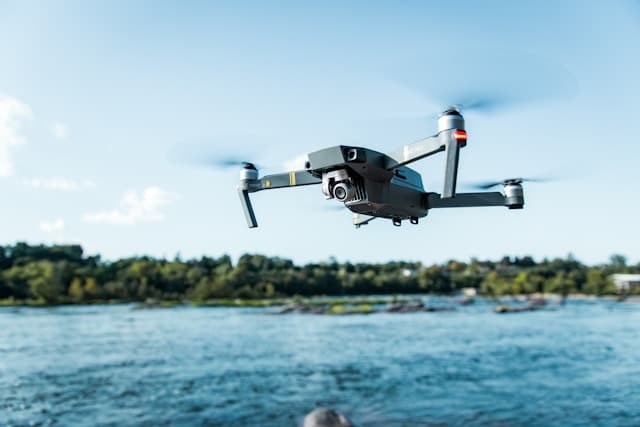What Are the Ethical Considerations of Using Drones in UK Wildlife Conservation?

Drones, or more professionally known as unmanned aerial vehicles (UAVs), have become increasingly popular tools for a variety of applications. From their use in media and entertainment to being employed in the military, drones have certainly made their mark. For this discussion, we focus on a more eco-centric application of drones – wildlife conservation. More specifically, we delve into the ethics surrounding the use of drones in the United Kingdom’s (UK) wildlife conservation efforts.
Drones in Wildlife Conservation
As technology continues to evolve, the use of drones in wildlife conservation has grown exponentially. Conservation efforts now often involve interdisciplinary teams of scientists and researchers who are using these unmanned aerial vehicles to monitor and manage wildlife populations, habitats, and ecosystems. According to scholar Mulero-Pazmany and his colleagues in a journal article published by Crossref, they are using data collected by drones to inform management decisions and improve conservation outcomes (doi:10.1109/JSTARS.2017.2765063).
A lire également : What Are the Prospects for Lab-Grown Meat in the UK’s Food Industry?
However, alongside this technological advancement, there are several ethical considerations that need to be addressed. Before we delve into these issues, let’s first understand the benefits and reasons behind using drones in wildlife conservation.
Drones offer several advantages over traditional wildlife monitoring methods. They can cover large areas of land quickly and efficiently, provide high-resolution aerial imagery, operate in harsh or remote environments, and minimize human interference.
A voir aussi : How to Create a Low-Budget, High-Impact Marketing Campaign for UK Small Businesses?
Ethical Considerations in Using Drones
While the benefits of using drones for wildlife conservation are evident, it’s crucial to consider the ethical dilemmas that may arise. As with any technology, drones have the potential for misuse and abuse.
Invasiveness is a major concern. Drones can disrupt wildlife behaviors, causing distress or even harm. Birds, in particular, may see drones as predators, leading to changes in their natural behaviors. The impact drones have on wildlife must be carefully studied and considered before any widespread deployment.
There is also the issue of privacy. Though drones may be used for monitoring wildlife, they can also inadvertently capture images of private property or individuals. This raises questions about who has access to this data and how it is used.
Finally, responsibility and accountability are key ethical considerations. Who is responsible if a drone disturbs wildlife or breaches privacy? How are drone operators held accountable? These questions need clear answers to ensure the ethical use of drones in wildlife conservation.
Guidelines and Regulations for Drone Use in Conservation
Recognizing these ethical concerns, the UK has issued guidelines and regulations governing the use of drones in wildlife conservation. According to Google’s Scholar, all drone operators must observe these guidelines to ensure minimal disturbance to wildlife and respect privacy rights.
One important guideline states that drones should maintain a certain distance from wildlife to minimize disturbance. Similarly, drones should avoid flying over private property unless permission has been granted. These measures aim to balance the benefits of drone use with respect for wildlife welfare and human privacy.
Towards an Ethical Use of Drones in Wildlife Conservation
The ethical use of drones in wildlife conservation requires a careful balance of benefits and potential harm. Research has shown that, when used responsibly, drones can play a vital role in conservation efforts.
The scholar Mulero-Pazmany emphasises the importance of a comprehensive understanding of the potential impacts on wildlife, coupled with the development of clear protocols for drone operation. This understanding, coupled with effective regulation, can mitigate many of the ethical concerns associated with drone use.
In addition, fostering a culture of responsibility and accountability among drone operators is essential. This includes training in ethical drone operation and the creation of accountability mechanisms to deal with misuse.
Engaging the Public in Ethical Drone Use
Public engagement has a significant role to play in promoting the ethical use of drones in wildlife conservation. This can be achieved by educating the public about the benefits and risks of drone use, and by encouraging public involvement in policy-making decisions.
Social media platforms can also be utilized to educate and engage the public, highlighting the benefits of drone use in conservation while also addressing ethical concerns.
In conclusion, while drones present exciting opportunities for wildlife conservation, careful consideration of ethical issues is essential. By balancing the benefits of this technology with respect for wildlife welfare and human privacy, it is possible to harness the power of drones for the good of conservation.
Understanding the Social Challenges of Drone Use in Conservation
Drones have undeniably made a significant impact in the field of wildlife conservation, but they also present various social challenges. According to Google Scholar, drones’ use in wildlife conservation can sometimes be seen as a disruptive force, altering the balance of nature (Mulero-Pazmany, "Export Citation", n.d.).
One of the key challenges is the fear of privacy invasion. As drones fly over areas to monitor wildlife, they may inadvertently capture images of private property or individuals without their consent. This concern extends to not just human residents in the area but also the privacy of the wildlife themselves. Continuous surveillance can lead to changes in animal behaviour and introduce stress in their natural habitats.
Another social challenge associated with the use of drones in conservation is the potential for abuse or misuse. Drones, like any other technology, can be misused intentionally or accidentally. For example, drones can be used to harass wildlife, or their images can be used to exploit protected areas.
A possible solution to these issues, as proposed by Google Scholar, involves implementing comprehensive guidelines and regulations. It’s also critical to publicly engage in the discussion of drone ethics in wildlife conservation, raising awareness and understanding of the issues at hand.
Policy Briefing and Future Directions
It’s clear that the use of drones in UK wildlife conservation is a complex issue, with many different ethical and social considerations at play. As a result, it’s crucial to continually reassess and reevaluate the policies and regulations surrounding their use.
Google Scholar notes that a policy briefing could be an effective method to ensure all stakeholders are aware of the ethical considerations and can contribute to discussions about potential solutions. This briefing could outline the benefits and drawbacks of using drones in conservation, discuss the regulations currently in place, and propose potential amendments or new rules.
Future directions for drone use in wildlife conservation could also be considered. For example, unmanned aircraft could be adapted to cause less disturbance to wildlife, such as using whisper-quiet technology or "bird-friendly" designs. Additionally, regulations could be updated to reflect advances in drone technology and changing societal attitudes towards privacy and surveillance.
In conclusion, while drones have transformative potential in the field of wildlife conservation, it’s essential to navigate the ethical terrain with careful consideration. With well-informed policy decisions and continued public engagement, the future of drones in UK wildlife conservation is promising. The key to success will be balancing the many benefits of drones with respect for wildlife welfare and human privacy rights.
